Film Name:流浪地球 / The Wandering Earth
After watching The Wandering Earth, I remained unsettled for a long time—even now, I haven’t fully processed it… Despite being bombarded by countless reviews of dubious authenticity and preparing myself mentally, the actual viewing delivered an impact that surpassed my expectations.
I’m thrilled and excited that we now have such an outstanding domestic sci-fi film.

Emotionally speaking, I’d give The Wandering Earth a perfect score. Even rationally, my praise for it remains high—since the 21st century, especially after the dawn of the “domestic blockbuster era,” sci-fi films seemed like a forbidden zone filmmakers avoided like the plague. Those who dared venture in often met with disastrous failure.
All that will change after The Wandering Earth: it isn’t a milestone of achievement, but a clarion call to charge forward. This, in my view, is the true meaning of what we call “the dawn of Chinese sci-fi cinema.”
[Friendly reminder: Spoilers ahead.]
Science fiction enthusiasts form a unique demographic, with their numbers growing proportionally to a region’s level of development. When it comes to sci-fi films, their aesthetic standards and appreciation differ significantly from those of the general audience. A high-budget commercial sci-fi production driven by profit motives cannot cater solely to hardcore fans, making the balancing act exceptionally challenging.
—This context is relevant because a significant portion of the current criticism directed at The Wandering Earth originates from established sci-fi enthusiasts and fans of Liu Cixin’s original novel. They express dissatisfaction either with the film’s “reckless” adaptation of the source material or with its overly simplistic world-building riddled with plot holes.
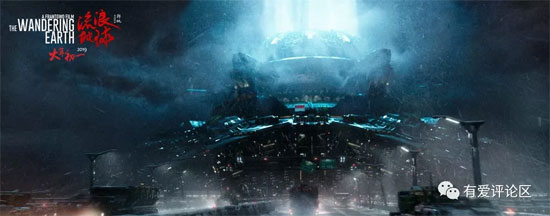
For instance, in the original novel, before the “Wandering Earth” plan commenced, there was a debate between the “Earth Escape Faction” and the “Spaceship Escape Faction.” If the film had retained this, its narrative logic would have been smoother. Another example is the design of the planetary boosters—the film offers no further explanation, as if their smooth operation according to plan were a given. For meticulous viewers, this is almost unforgivable…
These flaws exist, and denying them is pointless—but literature (novels) and film (visual media) are fundamentally distinct art forms (with film typically being more accessible). Adaptations inevitably sacrifice some logic and completeness for the sake of “dramatic impact.”
In fact, Liu Cixin himself expressed satisfaction with The Wandering Earth’s adaptation. The film focused on key segments with judicious selection, achieving ambiguity while retaining fundamental elements.
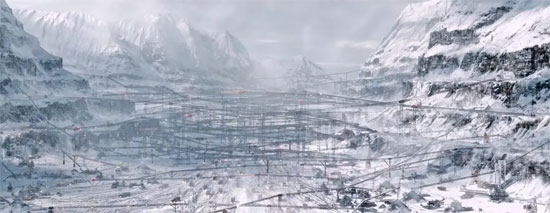
Science fiction ≠ educational film. It should first and foremost be an artistic creation, with “science” serving as its most vital creative medium and element. The Wandering Earth succeeded in satisfying both mainstream audiences and sci-fi enthusiasts—its adaptation and balance were triumphant.
Moreover, beyond “scientific rigor,” sci-fi films should prioritize “popular science.” I don’t consider myself a hardcore sci-fi fan; the physics and astronomy I learned in school long ago faded from memory. and my recent enjoyment of sci-fi works has remained purely at the level of entertainment. If The Wandering Earth had been as meticulously precise and rigorously scientific as some hoped, it might have alienated a large audience like me, ultimately becoming a niche celebration that loses money.
The film’s current level of presentation strikes just the right balance. After all, I found myself eagerly researching Jupiter’s gravity, gravitational slingshots, and the Roche limit after watching it…
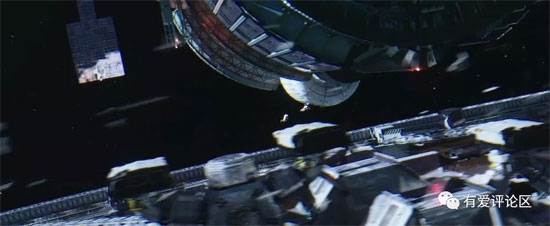
Relatively speaking, the visual effects in The Wandering Earth have drawn the least controversy. Even those who feel it “falls significantly short of world-class VFX” generally acknowledge the film’s achievements.
I reckon it’s like makeup: “Little Broken Ball” isn’t naturally stunning, nor can she splurge on high-end cosmetics. But she knows how to style herself—highlighting strengths while concealing flaws. What might be a 5/10 looks like an 8/10 with the right touch.
The film’s visual effects strategically allocate resources where it counts most. Consider the truly breathtaking scenes: they predominantly feature static or semi-static wide shots and sweeping environmental depictions—like the ice-covered surface, the sphere covered in thrusters, or Jupiter pulling Earth—leaving a profound impression.
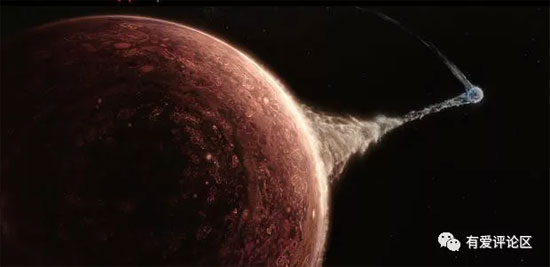
However, the film features far fewer prop details and micro-scale visual effects… Well, what can you do? Look too closely and the illusion shatters.
That said, The Wandering Earth still goes all out to make its microscopic elements believable or entertaining within its limitations—and that’s precisely why I adore the “little broken sphere” above all else.
My favorite scene in the film is early on, when Liu Qi takes Han Duoduo to skip class and “rent” protective suits at the black market—this segment showcases the bustling life of Beijing’s underground city. Though just a fleeting glimpse (and not without its flaws), it thrilled me immensely. If the runtime had allowed for more detail, with more realistic and refined details, it could have painted a uniquely Chinese “cyberpunk” tableau within the framework of Chinese cultural language.
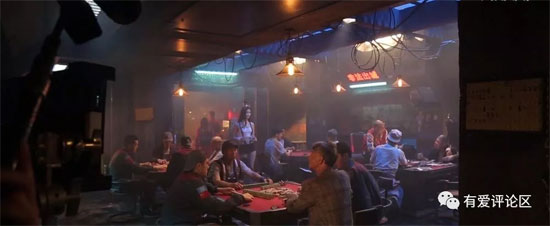
Such everyday micro-details don’t necessarily depend on technology; they also hinge on whether they can resonate deeply.
To me, it’s the durian-flavored dried earthworms, Han Zi’ang’s VR bribe for the jailer (“my girl” I’ve treasured for 50 years), listening to “Song of the Islands” on an old phone, and the relentlessly catchy Beijing Traffic Bureau jingle:
“Roads are countless, safety comes first.
Drive recklessly, and loved ones weep.” These are the flavors that bring “The Wandering Earth” from space down to earth.
People are emotional beings, and we all have our biases. As a domestic sci-fi film, The Wandering Earth scratches many Chinese viewers’ “ticklish spots.” Most notably—we’ve started destroying our own landmarks too: Beijing’s “Big Pants,” Shanghai’s Oriental Pearl Tower, and the 2044 Olympic Tower (huh?). The protagonists’ route takes them from Beijing to Jining, then to Shanghai before heading to Hangzhou, with a planned detour through the Jiaxing shelter (evoking the Beijing-Hangzhou Grand Canal~). As a Zhejiang native living and working in the Yangtze River Delta region, this added a special sense of familiarity…
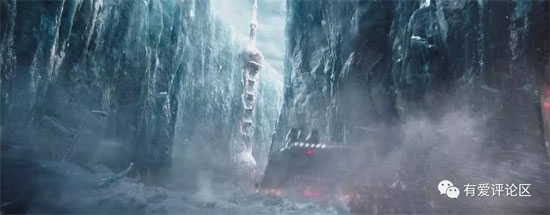
So, purely from a technical standpoint, The Wandering Earth is a polished, well-crafted, and thoroughly enjoyable masterpiece.
As for the film’s core narrative, I equally admire it—disaster-themed sci-fi films inevitably carry an inherent “hero complex.” We rarely witness the struggles of every individual; instead, we prefer the romantic notion of a few heroes or a small team saving the world. Hollywood has promoted the idea of “God bless America, America blesses the world” countless times…
In The Wandering Earth, the diverse CN171-11 rescue team embodies this savior archetype! The moment for China to turn the tide has arrived! Yet the film avoids simplistic heroism. Beyond the fervor, it maintains a cool-headed perspective and expansive vision.
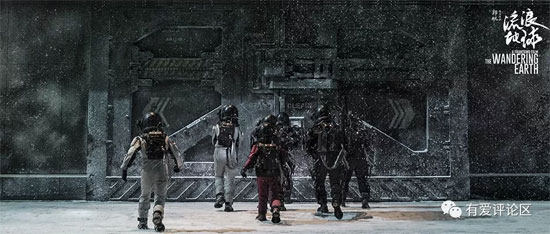
Indeed, Liu Peiqiang is a hero, and the CN171-11 rescue team are heroes. Yet they are not the only ones who remain vigilant amidst widespread complacency; they are but one among countless individuals who dedicate themselves wholeheartedly until their final breath.
Before entering the space station’s main control room, Liu Peiqiang discovered others also blasting through the hatch, fighting against the moss’s “defection” just as he was. Without the sacrifice of his comrades, Liu wouldn’t have even reached the control room. The engine restart employed a “saturation rescue” approach—it wasn’t the CN171-11 rescue team that delivered the ignition stone to Suravish. “Igniting Jupiter: A Desperate Gamble” was a long-abandoned scientific proposal. Ground crews operated without official guidance, yet when Liu Qi and his team succeeded, flames erupted nearly 5,000 kilometers high from the other two engines almost simultaneously…
History is never the solo effort of a few individuals, but the convergence of countless coincidences into an inevitable outcome. Here, heroes speak every language—Chinese, English, Russian, Japanese, Korean, French, and more. Glory does not belong solely to the Chinese; it belongs to all of humanity.
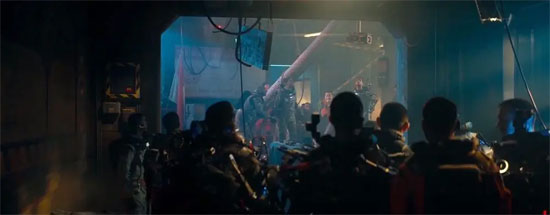
This is the grandeur of The Wandering Earth (One may choose to overlook the deliberate sentimentality and awkwardly sentimental moments).
The film’s storytelling approach, visual effects, and narrative structure all bear the hallmarks of Hollywood cinema (after all, the rules were gradually established by them). Yet the profound attachment to “home” and the longing for one’s homeland are uniquely Chinese characteristics within sci-fi.
I recall in The Three-Body Problem, the Earth-Three-Body Organization (ETO) split into two factions: the Descenders and the Savers. Yet what truly intrigued me was the later emergence of the Survivors—those who hoped their descendants might endure. This faction was predominantly composed of Easterners, particularly Chinese. Though this faction soon faded from the narrative, it subtly revealed the Chinese obsession with homeland, family bonds, and the continuity of bloodlines.
This theme resonates in both The Three-Body Problem and The Wandering Earth.

The “Wandering Earth Plan,” which involves fleeing with the entire planet, could be easily abandoned. Perhaps the true purpose lies in the “Seed Plan,” where the guiding space station carries human civilization to safety… Yet the Liu family in the film disagrees. We can’t bear to abandon even our “little broken ball,” let alone millions of family members? — This ideological difference gives The Wandering Earth its own spiritual language.
Science fiction ultimately tells stories we all recognize. Liu Cixin, the original author and film supervisor of The Wandering Earth, stated in an interview:
“When people ask me how my novel achieved success, I say, ‘If just one person reads my novel and does something they’ve never done before on a night walk—like looking up at the stars—then it’s a success.’ The greatest significance of Chinese sci-fi cinema lies in broadening our horizons. It lifts our lives beyond the confines of our own little world, allowing us to see farther, to expand our life experiences into uncharted times and uncharted spaces.”

Eastward I stand by the Jieshi Rock, gazing upon the boundless sea. How vast and still the waters flow, how majestic the islands rise.
Trees grow thickly, grasses flourish abundantly. Autumn winds howl, great waves surge.
…When “Viewing the Vast Sea” plays at the film’s conclusion, “science fiction” gains a new, distinct hue. Our historical myths feature figures like Nüwa, Kua Fu, Jingwei, Yu the Great, and the Foolish Old Man… Who will shape our future?
Thanks to director Guo Fan for his daring gamble, to diligent author Liu Cixin, to savior Wu Jing who invested his own capital, and to every contributor to this film. The Wandering Earth may not be perfect, or even outstanding, but it marks a new beginning for Chinese sci-fi.
Please specify:Anime Phone Cases » The Wandering Earth 流浪地球 2019 Film Review: Chinese science fiction can set sail once more from here.